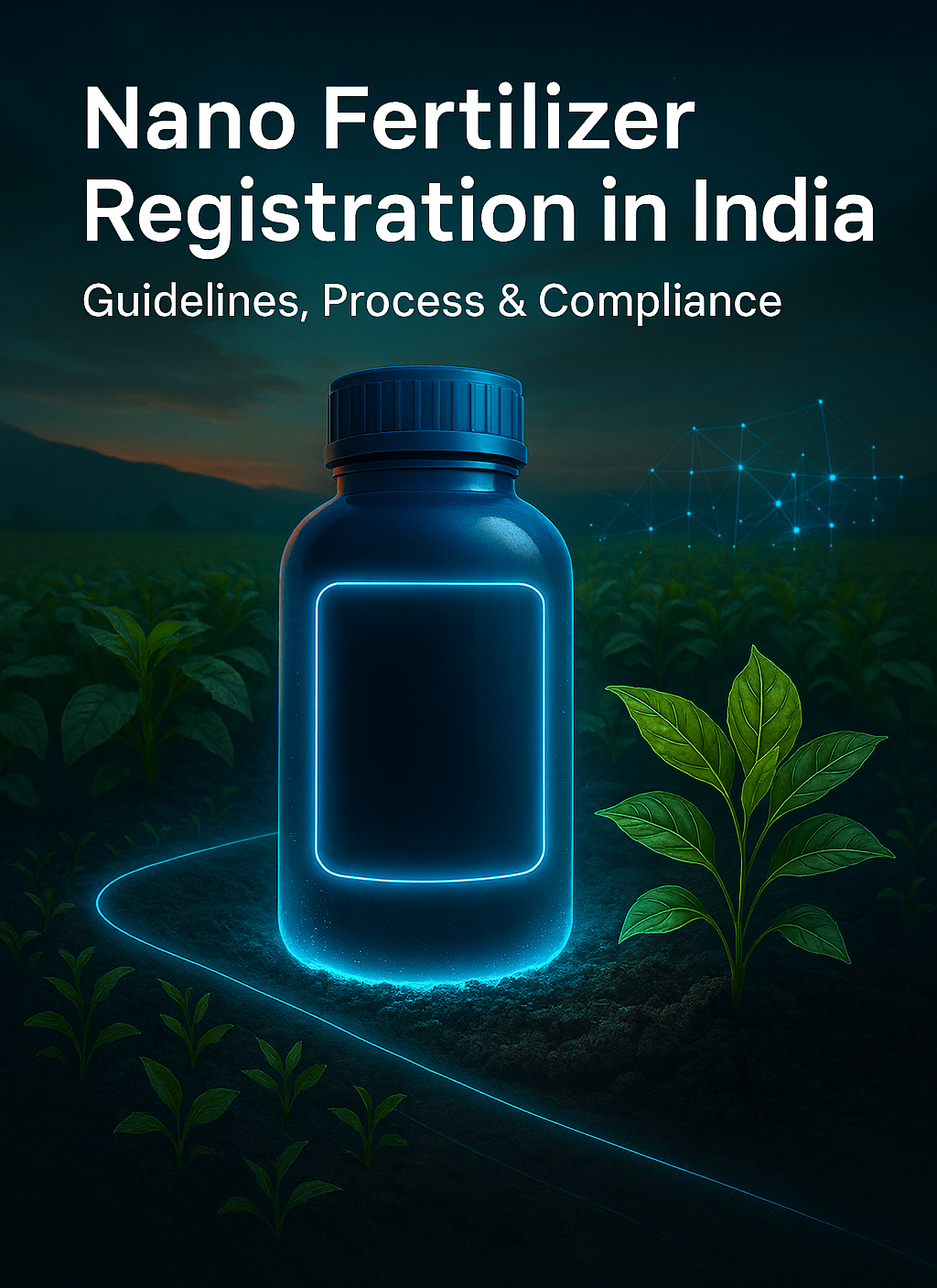Nano Fertilizer Registration in India | Guidelines, Process & Compliance
Introduction to Nano Fertilizer Registration in India
The quick progress of agro-technology has placed nano fertilizers in the limelight as one of the efficient and sustainable means of nutrient entry as opposed to traditional nutrient input. Having a very small particle size (roughly between 1 and 100 nanometers), these fertilizers are able to have a targeted delivery of the nutrients, an increased rate of absorption and minimal surface runoff. In India, the application of nano-based agri-inputs increases as the country aims at transformation to precision and climate-resilient agriculture.
But their innovative properties and possible environmental impact impose a complex regulatory procedure on them. According to Fertilizer Control Order 1985 (FCO) of the Ministry of Agriculture, all fertilizers in India including those in nano-formulations such as Nano Urea and Nano DAP are registered. Manufacturers of nano fertilizers in India will be required to meet strict regulatory standards such as ICAR tests, toxicological analysis and agronomic testing of their products.
This blog post will give a detailed account of the procedure of nano fertilizer registration in India, documentation, the field testing procedure at ICAR, safety standards and the Department of the Central Fertilizer Committee (CFC). It also details why the regulatory approval should be in compliance with FCO and how expert consultants can help approvals to be attained faster.
Be it the manufacturer, importer or an agritech startup, knowing about the nano fertilizer regulatory guidelines is very important to be able to have access to markets without legal trouble, common trust, and exportability. Let us look at the whole process of registering and unleashing the potential of the nano agri-inputs in Indian agriculture.
Understanding Nano Fertilizer Registration in India: Scope and Importance
As India paves the way for precision agriculture and a green concept that involves sustainable nutritive management, nano fertilizers are emerging as the next big thing. Due to their special potential of promoting nutrient utilization efficiency and reduction of losses to the environment, they are becoming a very valuable resource in contemporary agriculture.
Nevertheless, the emergence of such innovation means that strict regulation and scientific validation are necessary. In a systematic approach to regulating nano-formulated fertilizer, the Government of India, under the Fertilizer Control Order (FCO) has developed an organized system of registration and approval of such processed fertilizers.
This form of regulation guarantees the delivery of only the products that are technically explored to be safe, effective, and sound in terms of environment to the farmers in India. India is not alone in this fact as neurotoxicity and environmental stability overshadow the registration of nano fertilizers in various other countries.

What Are Nano Fertilizers and Why Regulate Them?
Although commercially new, nano fertilizers are a new generation of agri-inputs developed through nanotechnology to increase the efficiency with which nutrients are delivered and to increase their uptake by the plant. These are in the general form of a particle with a size of 1 to 100 nanometers, which makes them have more interaction with the plant cells because of the large surface area.
Nano fertilizer registration in India is of increasing regulatory importance due to their use in the precision agriculture field and also due to its potential to minimize adverse environmental impact. This is due to the fact that these products should be regulated so as to control the quality of the product and ensure that it is effective and safe as well as compatible. with the environment.
What Are Nano Fertilizers and Why Regulate Them?

Although commercially new, nano fertilizers are a new generation of agri-inputs developed through nanotechnology to increase the efficiency with which nutrients are delivered and to increase their uptake by the plant. These are in the general form of a particle with a size of 1 to 100 nanometers, which makes them have more interaction with the plant cells because of the large surface area.
Nano fertilizer registration in India is of increasing regulatory importance due to their use in the precision agriculture field and also due to its potential to minimize adverse environmental impact. This is due to the fact that these products should be regulated so as to control the quality of the product and ensure that it is effective and safe as well as compatible with the environment.
Benefits of Registering Nano-Formulated Fertilizers Under FCO
- Authorizes equal sale, importation and production under Indian law
- Ensures quality and safety because of scientific data validation
- Gives access to ICAR trials and schemes of public procurement
- Opens up avenues of foreign trade and exports
- Increases customer confidence and marketability of products
In India, commercialization of nano-fertilizers is the legitimate way in terms of proper registration under the Fertilizer Control Order (FCO).
Regulatory Framework: FCO Registration for Nano Fertilizers
With the signs of increased adoption of nano-based agri-inputs in India, nano fertilizer registration has formally been included in India within Fertilizer Control Order (FCO) 1985 under the aegis of the Ministry of Agriculture and Farmers Welfare. This regulatory policy makes it such that any type of nano fertilizer put in the Indian market must go through some screening of safety, quality, and effectiveness.
The regulatory requirement will facilitate the safe use of nano-formulated fertilizers and protect the environment and the human body. It sets the ground for compliance, and it is the promotion of innovation in agriculture that does not undermine the concept of sustainability or safety.
Registration with the FCO is mainly a statutory requirement but also a channel of securing credibility in the market, a right to participate in the government procurement schemes and also export preparedness. This particular establishment is procedural and the manufacturers have to work through this system through the Central Fertilizer Committee (CFC) which reviews and finally authorizes nano fertilizers.
Fertilizer Control Order 1985: Compliance for Nano Urea & Other Products
Fertilizer products, including those developed with the use of nano-technology, are found in the code of the Fertilizer Control Order (FCO) 1985, whose code is enforced under the Ministry of Agriculture. In 2021, a special section on nano fertilizers was introduced in the FCO in which guidelines are provided on the formulation, testing, labeling and approval of nano fertilizers.
Important regulatory aspects of nano products as per FCO:
- The classification of nano fertilizers (e.g., Nano Urea, Nano DAP)
- Agro performance mandatory ICAR trial data
- Definitions of particle sizes, nutrient content and shelf life
- Toxicology and eco-toxicological safety evaluation
- The route of application is Central Fertilizer Committee (CFC)
Manufacturers are required to have registration by the FCO Registration for Nano Fertilizer before any product can be put in the market.
Step-by-Step Guide: How to Register Nano Fertilizer in India
In India, the procedure to get nano fertilizer registered is also multilevel, which entails submission of information, testing in the field, and examination by professionals.
So this is how it looked:
Pre-R&D and Product Profiling
The chemical structure, base of formulation, and nanoparticle size should be defined.
Trial Safety Study
Carry out toxicology, bio-degradability and stability tests at a laboratory level.
Application Submission to CFC
Submit the registration dossier photochemical properties, physicochemical properties and formulation details as well as the trial protocols.
Field Trials With The ICAR Accredited Institutes
Test at multiple locations to test the agronomic efficacy on concerned crops.
Toxicological and Ecotoxicological Dossier Submission
A study into acute oral toxicity, dermal, and inhalation, fish toxicity and soil microorganism toxicity.
The evaluation of the Central Fertilizer Committee
The CFC is allowed to seek clarifications, re-trials or extra documentation.
FCO Final Approval and Notification
Upon its approval, it is notified in the FCO Gazette by means of a certain registration code.
This step-by-step procedure covers all nano fertilizer regulatory requirements 2025 and deals with products compliances.
ICAR Validation and Safety Requirements for Nano Fertilizers
The Indian Council of Agricultural Research (ICAR) can be considered as the key approval agency on the route of nano fertilizers in India. ICAR ascertains the nano-formulated products through evaluation as a part of the FCO registration process to ensure that they are not only agronomically effective but also safe to sustain agriculture in the long term.
ICAR undertakes talks as a managed multi-location field test of a nano fertilizer to evaluate the extent to which it can be efficient in variant agro-climatic regions. Such trials are useful to act as a science-based source to define that the product can enhance the nutrient use efficiency (NUE) without affecting the soil health or crop output.
Without the ICAR validation, there is no nano-fertilizer that can go through to final approval under the Fertilizer Control Order (FCO). This regulatory gateway will see that the products are not just innovative, but they are also field-tested, and this will inspire policymakers as well as the farmers.
Therefore, the ICAR assessment procedure is not a mere formality; it acts as the guardian of sound efficacy, concern for environmental stability, and safety of the agricultural populace of India.
Is ICAR Approval Mandatory? Understanding the Criteria

Yes, an ICAR (Indian Council of Agricultural Research) approval is a must for all nano fertilizers that wish to have a registration in India. The ICAR has a critical role in ascertaining the agronomic effectiveness during well-organized field experiments. Under the FCO, no product is allowed to register without validated data from ICAR.
The nano fertilizers need to attain these ICAR appraisal criteria:
- Obtainable increase in nutrient use efficiency (NUE)
- Stable output in terms of agro-climatic regions
- No aversive effect on the soil nor on plant growth
Steps to Obtain ICAR Validation for Nano Fertilizers
Procedure to be followed to get ICAR validation of nano fertilizers:
Whether you are a firm, individual or group, you have the opportunity to partner an ICAR-authorized testing institute
- Furnish your nano samples of fertilizers and test procedures
- Conduct at least two seasons multi-location late or early season
- Compare the data with the control groups and present the final reports
- CAR provides an endorsement letter to the FCO
- This validation makes the product to have scientific integrity and usefulness on field.
Documentation and Trial Requirements for Nano-Formulated Fertilizers
FCO nano fertilizer certification involves the preparation of a dossier that is elaborated.
This includes:
Formulation specifications: Name of the ingredients, particle size, nutrient content
Safety data: The acute oral, dermal, and inhalation toxicity
Safety to the environment: Aquatic toxicity, soil compatibility with microbes
Efficacy trial reports: of the institutes recognized by ICAR
Labeling proposal: according to the FCO norms (net content, usage instruction, safety symbols)
All the documents presented there have to be certified and conform to the Fertilizer Control Order nano products policy guidelines.
Requirements entail the following:
- Stability/shelf life study
- Packaging compliance
- GMP evidence
Timeline, Cost, and Export Eligibility for Nano Fertilizers in India
What is the time frame of registration of nano fertilizer?
The entire process, including R&D and FCO listing might require up to 18 to 24 months, depending on:
- Timely ICAR trials
- The Goodness of data submitted
- The number of reviews circles conducted by CFC
Registration Cost of Nano Fertilizer Registration in India
- The basic cost of registration of nano fertilizer in India is between 30 and 50 lakhs, and this cost depends on:
- Stages of field trial and place of location
- Toxicology testing charges
- Dossier preparation and fees of the consultants
- This expense is not inclusive of the post-registration monitoring and compliance expenditure.
Can Nano Fertilizers Be Exported After Registration?
It becomes possible after a nano fertilizer is registered in the FCO and is therefore capable of being exported with the right export license. The product has to abide by the standards of that importing country Importers have to abide by laws in the DGFT as well as the customs.
Need for Expert Support: Hiring Nano Agri-Input Registration Consultants
Due to the complexity of navigating through regulations, most companies in India today have taken to employing nano agri-inputs registration consultants to handle their registration process all the way to the end.
Why Would You Hire Consultants to Get a Nano Fertilizer Approved?
- Skillfulness in the creation of documents as per the 2025 norms
- Connection to ICAR trial sites and test laboratories
- Quicker inquiry answer at the Agricultural Ministry
- Guideline on nano fertilizer compliance and export strategy
Pre-submission audits are also guaranteed by regulatory consultants, which help to avoid queues because of incomplete information and documents.
Frequently Asked Questions
It is the legal process of approving nano-formulated fertilizers for use in India under the Fertilizer Control Order (FCO) 1985.
Submit safety, efficacy, and ICAR trial data to the Central Fertilizer Committee (CFC) as part of a structured registration process.
You’ll need formulation specs, toxicology data, field trial reports, ICAR validation, and proposed labels, among others.
The Central Fertilizer Committee (CFC) under the Ministry of Agriculture approves nano fertilizers.
Yes, ICAR validation is mandatory to establish efficacy across Indian agro-climatic zones.
The process may take 18–24 months depending on trial durations and review timelines.
Nano fertilizers must undergo toxicity tests and multi-location ICAR field trials.
Yes, once registered under FCO, nano fertilizers can be exported with valid licenses.
Yes, the FCO has a separate chapter and policy for nano-based fertilizers.
It typically ranges between ₹30–50 lakhs, depending on product complexity and trial needs.


